Managing a vacation rental is a lot of fun and brings in a nice extra bit of income. However, if guests do not treat your rental well, it can be challenging. If you’ve ever had someone throw an unauthorized house party or even left behind the unmistakable smell of cigarette smoke, you know how frustrating it can be. Fortunately, there are things you can do to ensure that these kinds of things happen less frequently, and the easiest way is through setting some house rules. This way, you let your guests know what is and is not allowed on your property. Vacation rental house rules can also help establish some housekeeping tips to make your life easier when caring for your property. Next to your actual listing, these Airbnb house rules are just as important in having a clear communication channel with your guests.
Below, you will find a guide to crafting the perfect house rules and enforcing them without turning away your guests. We have also included a template of recommended rules you may want to consider.
Download it now for free:
Free Vacation Rental House Rules Template
Writing house rules doesn’t have to be a drag. Choose from these four different styles, and customize them any way
you want!
First, what are Airbnb house rules?
Short-term rental house rules are guidelines that you, as the Airbnb host, will give your guests to set expectations about their stay. These rules include what they can or can’t do, and also provide them with an idea of what kind of host style you may have. By checking out your expectations, guests can see whether your property would be a good fit for them before booking. You’ll find that a well-defined set of rules can help you avoid a slew of problems like damage to your property or even disagreements with your neighbors. A very clear, fair, and specific list will also help you hold your guests accountable.
Establishing these rules beforehand will create a better experience for you and your Airbnb guest, leading to repeat stays and better reviews. However, before you begin to craft your rules, you’ll need to understand what type of guest your listing will attract. You don’t want to be overbearing since the guest is most likely there on vacation, but you do want to clearly state your boundaries.
Depending on the type of guest you want to attract, you may want to add some personality to the rules. You can make them short and to the point. Or you can make them funny and lighthearted. Whichever way you choose, here are some guidelines to follow to write effective Airbnb house rules.
Tips for writing effective Airbnb house rules
Follow these tips to write effective Airbnb house rules that your guests will pay attention to:
- Keep them short: No one wants to read a 20-page legal document when they’re looking for a place to stay on vacation, so keep the list of house rules short, and mention the most important rules first.
- Keep them simple: You should never overcomplicate your house rules. Keep your vacation rental house rules simple so that guests will read them thoroughly with no confusion.
- Make them accessible for all guests: You may also have international guests, so be conscious of this when writing your rules. Keep them easy to translate by using simple sentences.
- List them in various places: The house rules should be placed in your Airbnb listing in the rules section, and as a reminder, you can either email a short version to guests or include them in your digital guidebook. Hostfully’s digital guidebooks are a wonderful place to store important information, and you can do it in a way that you do not overwhelm your guest.
- Keep them up-to-date: Short-term rental house rules can change with time and as you gain experience, so revisit your house rules from time to time. Don’t be afraid to add new ones, take off ones that aren’t doing any good for you, and make changes as needed. In short, you should keep them as up-to-date as you keep your listing.
Where do you communicate Airbnb house rules?
1. On your Airbnb listings
It’s pretty simple on Airbnb. Head over to “Your Listings” on the Airbnb website. Then, select the listing that you want to edit by clicking “Manage listing.”
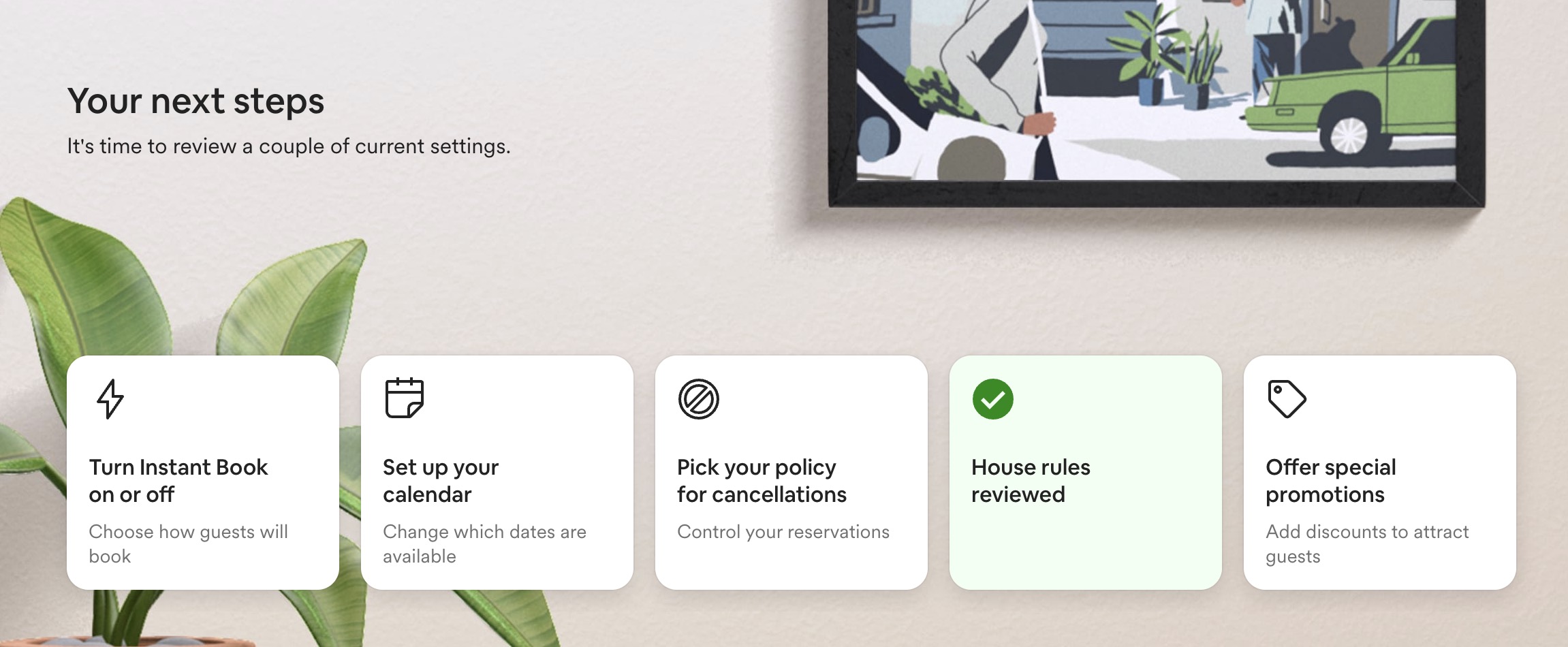
Source: Airbnb
From there, click on “Booking settings,” and find the line that says “House rules.” Click on edit and you’ll have a space to add your rules.
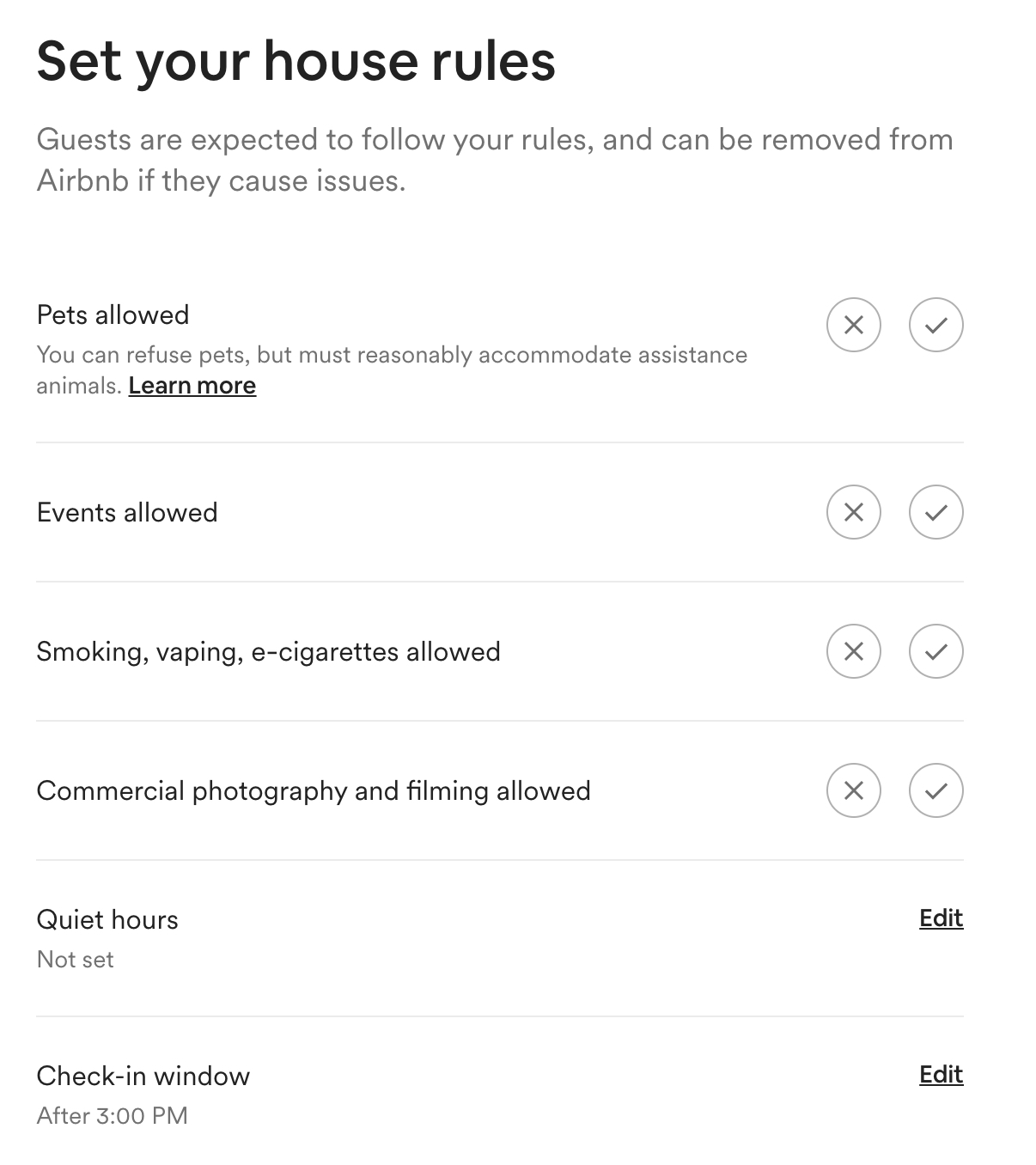
Source: Airbnb
You’ll see some preset rules, and you can select the ones you want to apply to that listing. Next, add any custom rules you want and apply those. Finally, hit “Save.”
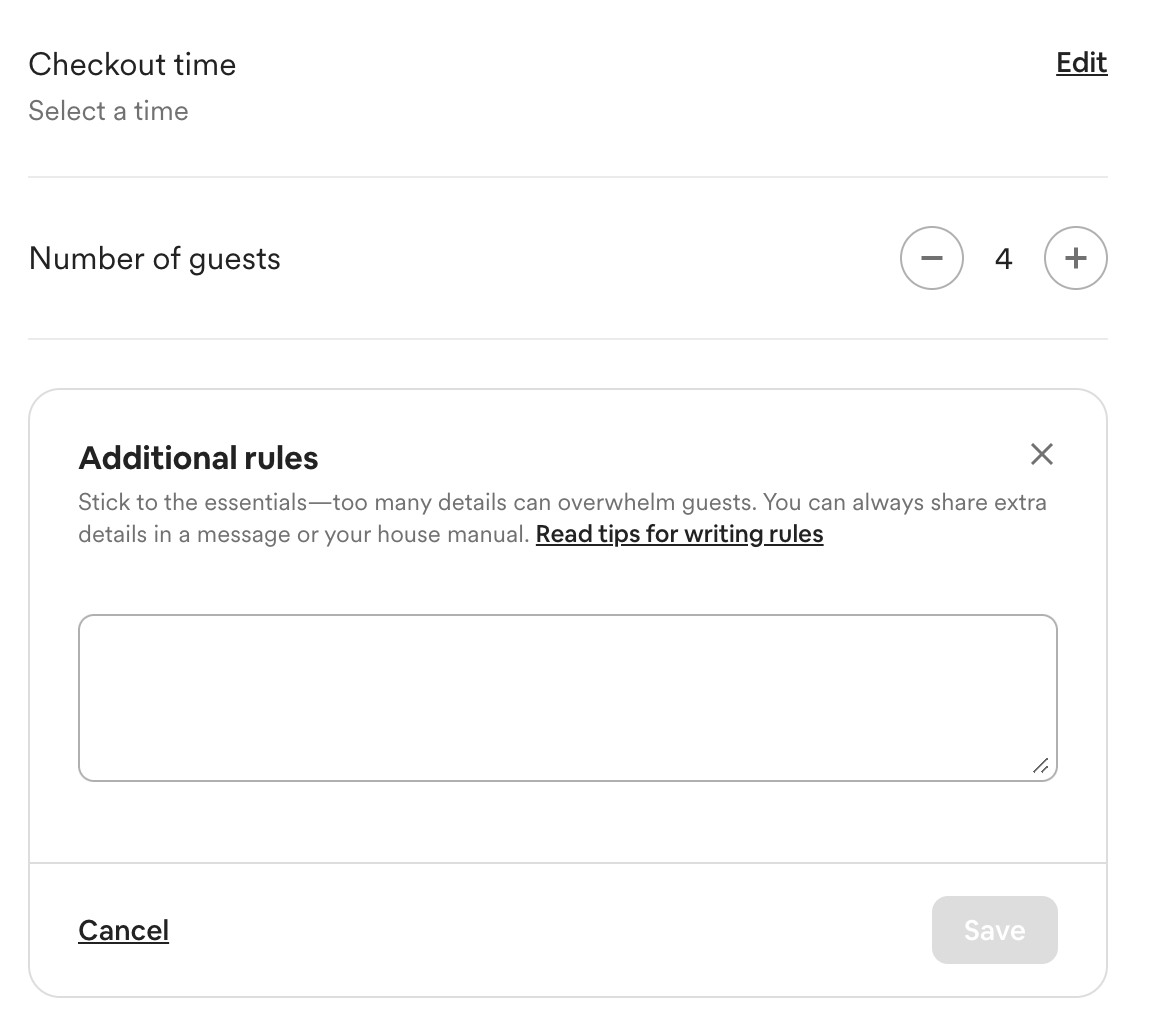
Source: Airbnb
When a potential guest scans your listing, they will be able to see your rules and decide whether they will be a good guest for your space.
We recommend reiterating some or all of your rules in your welcome letter to make sure your guests know your expectations. There are four primary times you will absolutely want to connect with your guests: pre-booking, between their booking and check-in day, during their stay, and after their visit. The pre-booking and check-in, are where you want to mention the rules.
2. In your digital guidebook
Even if you’ve already included your house rules in your Airbnb listing, it’s a good idea to share them again in a digital guidebook. After all, if a guest books their trip months in advance, they’re probably not going to remember that list of rules they saw when making their reservation.
With Hostfully, it’s easy to set and customize your house rules and assign them to the property (or properties) they apply to. First, click on the “House Manual” tab of the Hostfully Guidebooks dashboard.
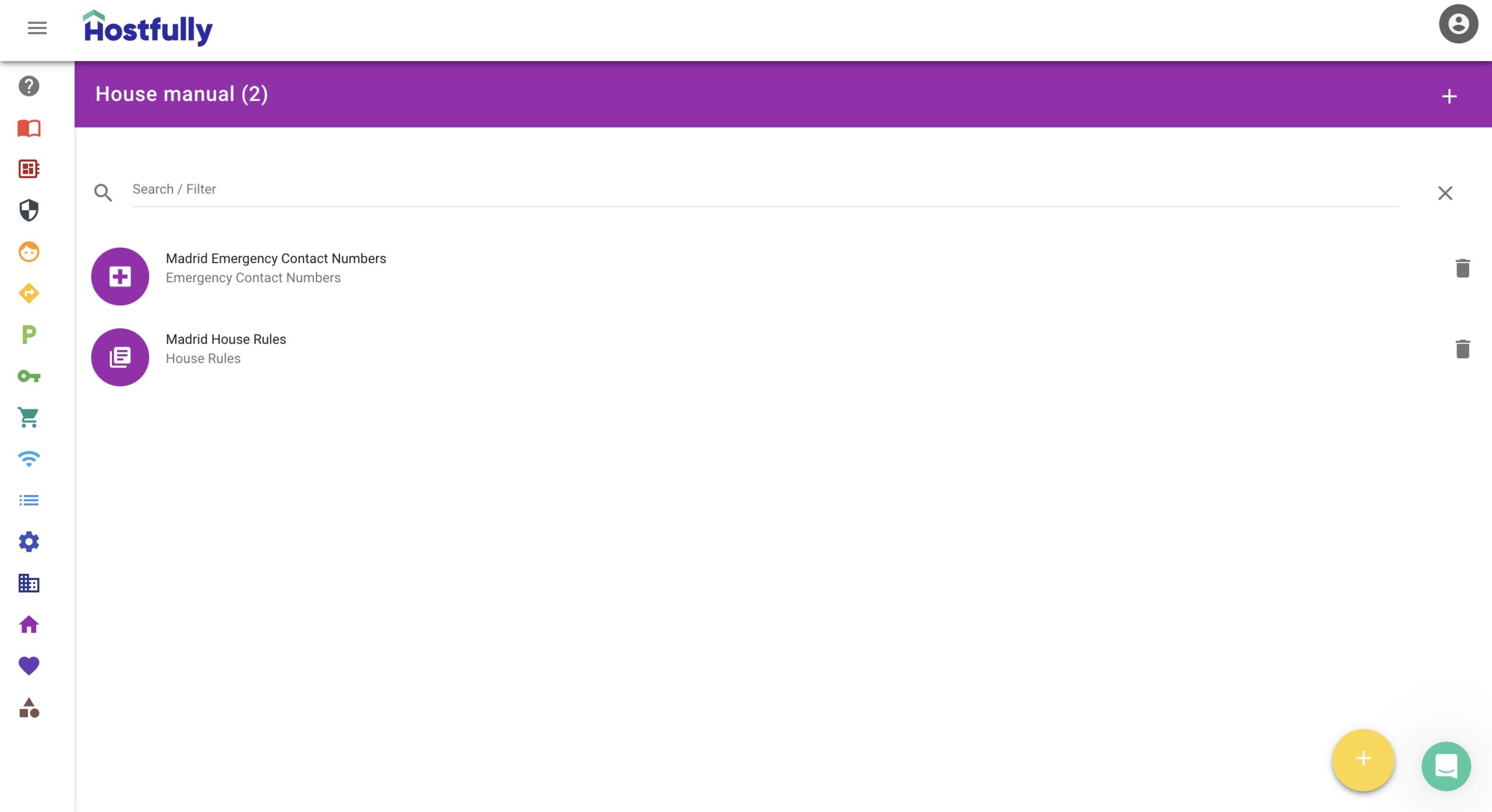
Source: Hostfully
Select the property you want to write house rules for, and start setting your rules! Hostfully provides a list of pre-generated rules that you can add to, delete from, and modify as you need. You can also assign these house rules to whichever property they apply to.
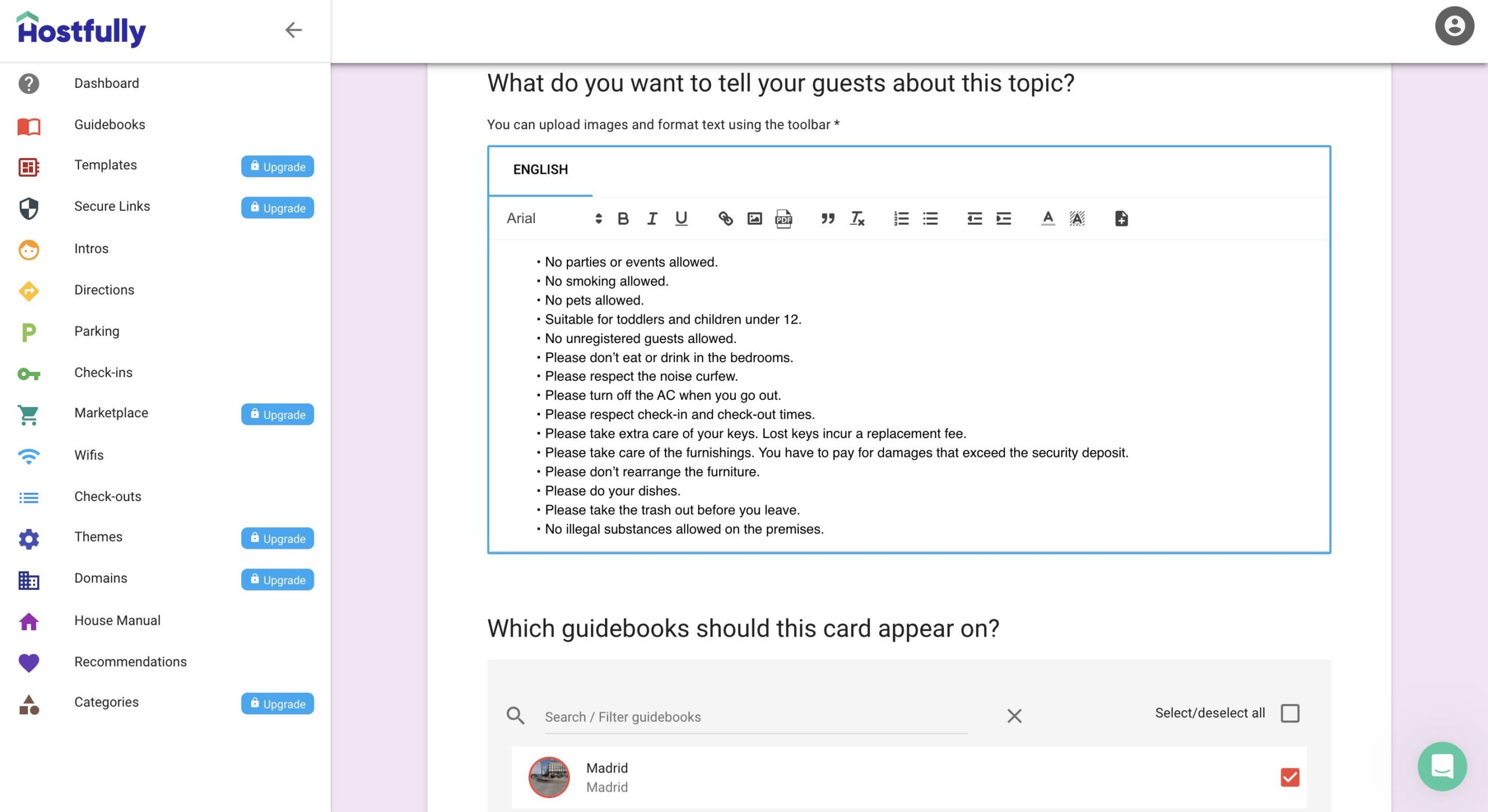
That way, all your guests have your house rules at their fingertips throughout the entirety of their stay. This can help you safeguard your property and protect you from a guest who claims they didn’t see your rules before breaking one of them.
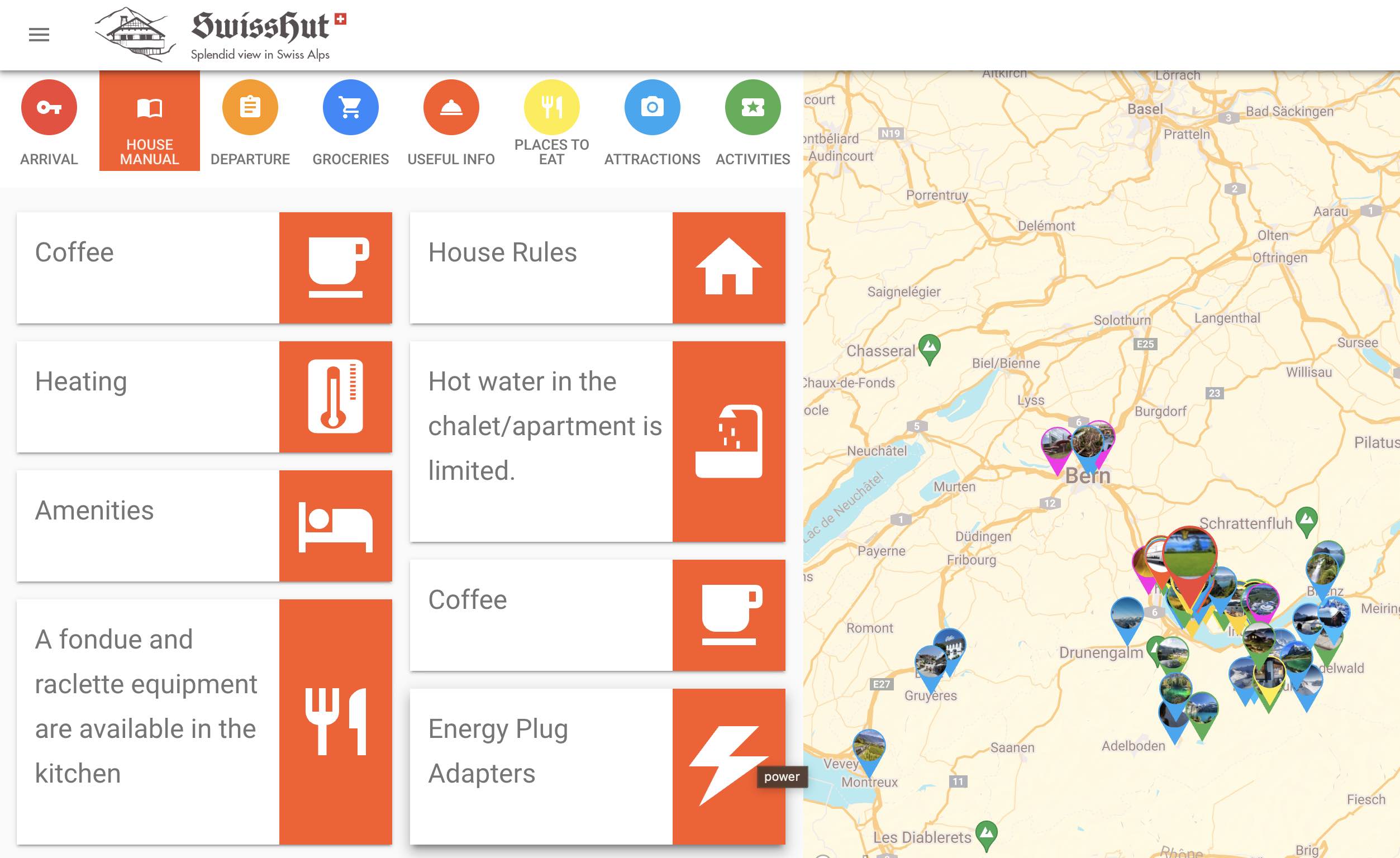
Source: Hostfully Guidebooks
Examples of what you should mention in your house rules
So that you do not start with a blank screen, we have several examples of what types of rules you will want to consider adding to your list. So let’s dive right in!
Overview
You’ll include an overview as part of your rules. Here, you get to set the tone for your house rules. You should make a simple statement about why guests should follow them, and be sure you mention what may occur if they do not adhere to the rules. This may include, for example, deductions from a security deposit.
Check-in and check-out times
With your listing, specify what time check-in and check-out are for your guests. Is there a fee for a late check-out? Let them know what to expect ahead of time; this allows your guests to plan when booking their transportation and travel.
When you include how your guests check-in and check-out of your property, that could set your listing apart from others. If your guest knows they’ll be arriving late at night, you may want to provide options for how they can get in. A code-access lock on the door could make all the difference, rather than meeting you to hand over the keys. Listing your check-in/check-out procedure in your house rules could save you and your guest a headache. This is one of the reasons that self check-in has become so popular.
If you provide a key, include the penalty for a lost key. This could lead to changing the locks, arriving late at night, and unhappiness for both you and the guest.
Do you want to boost the guest experience while also reducing your workload? This is where automation can help you in a big way. First, you can use software to send check-in information in tandem with the house rules automatically. Second, you can use your vacation rental software with third-party integrations to reate and send unique door access codes.
Parking
Does your property offer parking? Is it numbered or street parking? How many cars are allowed?
Setting these expectations for your guests before their arrival will not only make it less stressful for them, but it may be the defining factor in whether they rent a car or not. You want them to arrive with a smile on their face, not walking in frustrated because they couldn’t park safely.
How can you make it easy for guests to find parking? With a digital guidebook, you can clarify parking instructions with detailed pictures.
Download it now for free:
Free Vacation Rental House Rules Template
Writing house rules doesn’t have to be a drag. Choose from these four different styles, and customize them any way you want!
Pets
Include your pet policy in your house rules so that you don’t receive any unexpected, furry “guests.”
If you decide to allow pets, be sure to do a thorough cleaning for pet hair after each stay. You may also want to establish a weight restriction. This will help you avoid damages or accidents.
Make sure you share this information upfront with your guests. Also, note that it’s becoming commonplace for hosts and managers to charge an extra cleaning fee for pets. So this may be something you should consider.
Smoking
Like pets, smoking could potentially turn off other guests since it can be hard to eliminate that smell. Clearly state the smoking rules at your property and where it’s allowed. If you allow smoking outdoors or on a balcony, be sure to include a place where they need to dispose of the cigarette butts.
More importantly, state clearly what the penalties would be if this rule, or any of the others, were broken. For example, if you know that it may cost $200 to eliminate the smell of smoke properly, clearly state in your house rules that any offenders will be charged $200 for smoking where it isn’t allowed.
Also, in your rules about smoking, you should mention what you expect out of your guests in terms of their recreational drug use as well. You will probably want to prohibit illegal substances from being used, sold, or present at all in your rental.
Footwear indoors
If your property has carpet or other delicate floorings, you may choose to ask guests to keep their shoes outside. While you can include this in your house rules, you can provide details for where guests should keep their shoes in the check-in guides.
Parties and visitors
Some properties allow rentals for parties or events. If this is your property, clarify the maximum number of people and cars allowed. Avoid being loose with any wording here, as different guests may interpret a “few” friends differently. Note the Homeowner’s Association (HOA) rules and quiet hours if your property is part of a development. Let your guests know during which hours the noise curfew is in place.
Airbnb extra guests
Your guests may meet other travelers or locals while exploring your city. Be sure you state what rules you have for bringing in unregistered guests. You want to ensure your property is cared for and the guests are held liable for any damage. Bringing in visitors can complicate this, so be sure to stand firm on this in your visitor guidelines.
Laundry, garbage, and recycling
Do you want your guests to load their towels or sheets in the washer before leaving? Do they clean and bring out the trash can? Clarifying these responsibilities in the house rules before booking and at check-in can let your guest know what to expect on their last day at your property.
You’ll want to list details for cleaning up before departure in your digital guidebook. It may also help to remind your guest of these responsibilities before their arrival.
Outdoor areas and pools/hot tubs
If your property includes an outdoor grill area or pool, discuss the safety rules first and foremost, since these could become liabilities to your Airbnb business. To ensure these amenities are appropriately taken care of, provide guests with directions on how to use, turn on, care for, etc.
Privacy
If you rent out only part of your residence, you may want to touch on privacy and what areas are off-limits. For example, is there a storage area they should not have access to? Should they enter through a specific door or use a particular restroom? Clearly list which areas are accessible and which are not.
Quiet hours
Many towns and subdivisions have strictly enforced quiet hours. If this is the case for your rental, let your guests know the quiet times and what they mean. If the area is especially strict, make sure to say that as well.
Security
You may have a home alarm system to help protect your rental and guests. If this is the case, be sure to outline how you expect your guests to use that security system. For example, if it is to be armed each time they leave the house, say so.
Damages
With most booking platforms, a guest will submit a deposit in the case of small damages. Minor accidental damages can happen to us all. However, you may want to clarify that if damages total to an amount greater than the deposit, you will file claims saying as much. Make sure you explain how you would proceed with filing those claims.
Emergency contact
In case of an emergency with your guests, it’s wise to provide them with emergency contact numbers within your city if they’re unable to reach you. This will also give your guest an extra sense of security while enjoying their relaxing vacation.
Compliance
Your rules will be simple, easy to understand, and reasonable. You will also make them available to your guests before they even book. As a result, you can expect that your guests will likely comply with your rules. Generally, people who use vacation rentals appreciate the beautiful space and privacy that rentals allow. However, every now and again, you’ll get a guest who isn’t as respectful. What happens then?
What happens if a guest breaks any of the Airbnb House Rules?
In your rules, be sure to lay this all out. Since Airbnb rules are legally binding, it would be in the best interest of your guest to have them follow what they agreed to. In most cases, the consequences of breaking rules will be a fee for clean-up, but there may be something more specific if the damage is substantial or difficult to remedy.
Airbnb house rules template
Here’s a sample set of house rules to give you an idea of how to organize and phrase them:
- Check-in is at 3 pm. I will send a key code to you 48 hours before check-in.
- Free street parking is available. However, please be aware of emergency lanes.
- Pets under 80lbs are allowed. A $25 cleaning charge will be added.
- No smoking in the house. Smoking is allowed on the back patio, and an ashtray is provided for butts. Do not dispose of butts in the bushes or grass.
- Please leave shoes outside by front and back doors.
- No parties or third-party visitors are allowed. Registered guests only.
- Please leave used towels in the bathroom. Before you leave, please remove the trash bag and recycling bin then bring them outside.
- The outdoor grill is available for guests. Please refer to the guidebook for how to operate and clean it.
- Upstairs is a private residence. Please stay on the ground floor only.
- Report any damages immediately. Any damages that exceed the deposit must be paid for by guests and will be reported to Airbnb.
While house rules may not always be an exciting topic, there can be an exciting way to deliver them to your guests. Hostfully guidebooks boost the guest experience, eliminate the need to answer repetitive questions, and create new revenue streams. Check out the latest examples to get inspiration for designing a Hostfully guidebook of your own.
Conclusion
Your Airbnb house rules can keep your property safe, but remember to balance protection and still encourage bookings. It is possible to use your house rules to establish expectations for your guests while still creating an environment for a great vacation. Have you ever had a guest violate a house rule you’ve set? What did you do? How did it all turn out? We’d love to know so we can all learn together. Please connect with us in the comments below.







